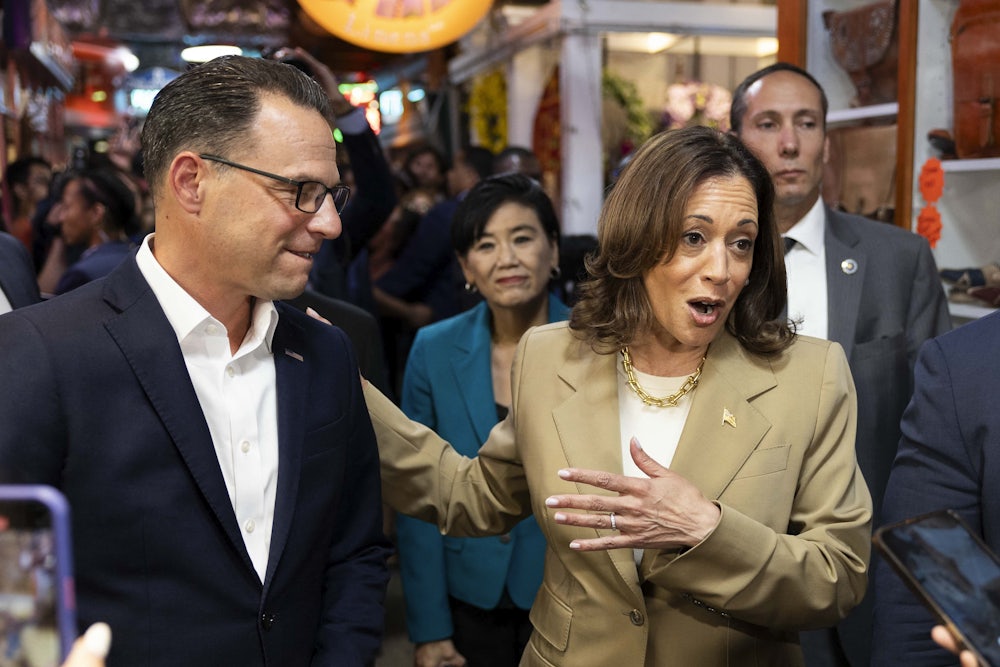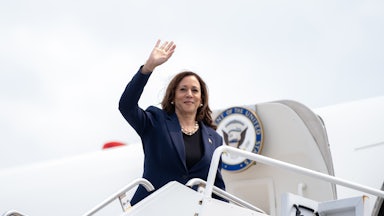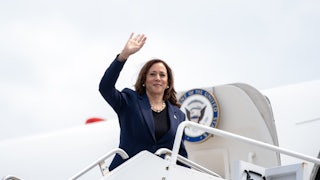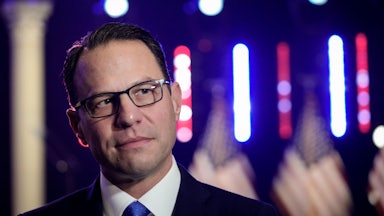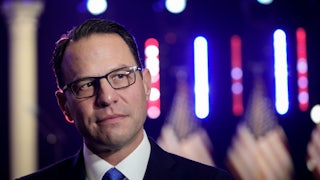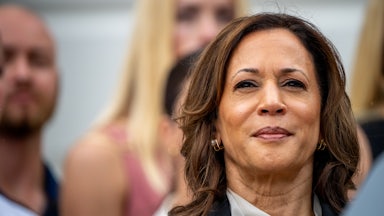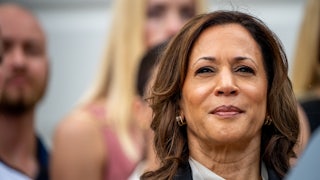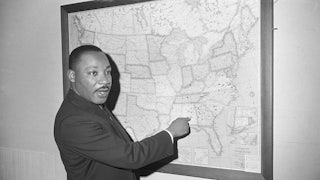President Joe Biden’s sudden decision to drop out of the presidential race shook up the political world not simply by scrambling the contest and giving moribund Democrats a new charge of energy. As important for professional and cocktail-party pundits alike, it also kicked off a round of that favorite quadrennial pastime, veepstakes speculation.
Should presumptive Democratic nominee Kamala Harris pick a successful swing-state Democrat such as Pennsylvania Governor Josh Shapiro, Arizona Senator Mark Kelly, or North Carolina Governor Roy Cooper? Should she send an ideological message by tapping a red state pol (Kentucky Governor Andy Beshear), the first openly gay running mate (Transportation Secretary Pete Buttigieg), or another woman (Michigan Governor Gretchen Whitmer)? Should she try to energize the party by throwing the selection open to convention delegates in Chicago next month?
At the risk of Grinch-ing up the game (which I enjoy playing too!), the answer is almost certainly that her selection will make no difference in deciding the presidential race—and whatever effect it does have won’t manifest in the expected ways.
Veepstakes speculation invariably focuses on the running mate’s home state and the presumption that his or her presence might give the ticket a boost there, though this consideration may carry more weight with the speculators than the choosers. “That may be a ‘traditional running mate consideration’ in the sense that party leaders once sometimes acted based on it and pundits often raise it, but it’s rarely been a characteristic of modern selections,” vice presidential scholar Joel K. Goldstein told me. “In fact, there are many instances of selections from small or large safe states and very few choices plausibly connected to home state considerations.”
Looking at all of the veep picks this century proves Goldstein largely right, as only Virginia’s Tim Kaine in 2016, and Wisconsin’s Paul Ryan in 2012, represented swing states at the time, and Virginia was only tenuously purple by that election. (For the record: Kaine and Hillary Clinton took Virginia, while Ryan and Mitt Romney lost Wisconsin.)
Nevertheless, conventional wisdom holds, for example, that choosing Texas Senator Lyndon Johnson boosted John Kennedy to the presidency in 1960. “You’ve got to admit that I was right,” the president told an aide afterward. “We couldn’t have carried the South without Johnson.” But there’s good reason to believe that JFK was wrong on that point and that LBJ’s vice presidential successors have not been any more help pulling their home states into their running mates’ columns.
“It’s unlikely that a running mate delivers a home state,” Kyle C. Kopko, a political scientist at Elizabethtown College, told me. “And it’s also unlikely that they deliver a key group of voters (like women voters, Catholics, ideological groups, etc.).”
Kopko and Christopher J. Devine, a political scientist at the University of Dayton, have authored a pair of books digging into poll numbers, vote totals, and other data to try to measure what effect, if any, a vice presidential pick has on a ticket. Their answer: not very much.
“According to our analysis of election and voter data over the course of a little more than the past century, a vice presidential candidate’s state of residence generally has no effect on how a presidential candidate performs in that state,” they wrote in Politico in 2016 (in an article from which I drew the aforementioned Kennedy quote). “The vice presidential home state advantage is, essentially, zero.”
While a vice presidential nominee’s home-state voters tend to be more interested in whether the local pol becomes vice president, that interest doesn’t translate into increased activism, contributions, or, most importantly, votes. In LBJ’s case, Kopko and Devine found, perversely, that Texans were more negative about him than other Southerners—who in turn viewed him more negatively than non-Southerners. The farther you got from Texas, in other words, the more you liked Lyndon (though he and Kennedy did win the state).
They also checked whether other traditional vice presidential calculi bear out—whether certain running mates goose support from discrete ideological or demographic groups, for example—and largely came to the same conclusion: not very much. “We didn’t find evidence, for example, that Geraldine Ferarro or Sarah Palin attracted more women voters to their party’s ticket,” Kopko told me. “Nor did Mike Pence attract more evangelical voters.”
There are caveats, of course! Kopko and Devine conducted a separate analysis focused specifically on the 2020 race and whether Harris or Pence had an effect. It “suggested that Harris provided some advantage to the Democratic ticket with regard to black women voters, but the effect was relatively small.” In a tight election like 2020’s—and, presumably, 2024’s—even a small effect could be important. Whether even the minuscule Kamala effect of 2020 is replicable is anyone’s guess, but history suggests it won’t be.
It does, however, raise the question
of whether Harris’s presence atop the ticket will further motivate those
voters. Kopko and Devine estimate that presidential candidates have roughly
three times as much influence on voter decisions as their running mates, so it
seems fair to wonder whether Harris topping the ticket will amplify the small
boost she provided four years ago. Maybe: Given that Black women are already the Democratic Party’s strongest constituency, there’s a limit to how many more votes they can provide. “Based
upon past data, [Harris] will likely garner an increase in support for Black
voters and Black women voters,” Kopko said. “It could be enough to matter in a
closely contested state.”
Another caveat is that running
mates do make a difference in one notable way. A “vice presidential candidate can indirectly influence
voter behavior,” Kopko said. “Specifically, the selection of a running mate
provides information to voters, and that shapes perceptions of the presidential
candidate. For example, if a running mate is viewed as unqualified, that will
diminish perceptions of the presidential candidate (think Sarah Palin in
2008).… In practical terms, that’s where we see the selection of
a V.P. mattering most in terms of electoral effects—by shaping perceptions of the
presidential candidate.”
Kopko and Devine cited a prominent example in a piece for the London School of Economics earlier this month: “Our statistical models suggest that after John McCain selected Sarah Palin as his running mate in 2008 and she committed a series of high-profile gaffes, voters became more likely to view McCain as too old to be president and questioned his judgment. Conversely, after Barack Obama selected Joe Biden, the data indicate that voters viewed Obama as increasingly likable, decisive, and experienced.”
Think of it this way: Choosing a running mate is famously the first presidential decision a candidate makes, so it gives voters a data point regarding their judgment. In this regard, Donald Trump’s choice of J.D. Vance—which he’s already regretting, apparently—may prove salient as voters ponder the wisdom of a scatterbrained septuagenarian picking a political neophyte half his age for a job whose most famous role is, as Thomas Marshall (Woodrow Wilson’s veep) once put it, “to ring the White House bell every morning and ask what is the state of health of the president.” (Never mind at this point that the Founding Fathers probably didn’t intend for the vice president to inherit the top spot.)
In the end, Harris’s best political strategy seems to be straightforward: Choose the running mate best qualified for the Oval Office. “Yes,” Kopko said, “I think ‘Good policy would make good politics’ sums it up well.”
